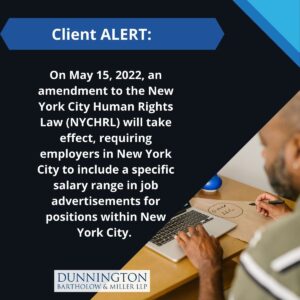On January 15, 2022, Local Law 32 of 2022 was enacted, which amends the New York City Human Rights Law (NYCHRL) by requiring salary transparency in job advertisements for positions within New York City.
Unless pushed back by the proposed amendment discussed below, starting May 15, 2022, employers advertising a job, promotion, or transfer opportunity in New York City must include a good faith salary range for the position in the advertisement. Specifically, the advertisement must state the minimum and maximum salary that the employer in good faith believes at the time of the posting they are willing to pay for the position (e.g., not “$15 per hour and up” or “maximum $50,000 per year”). If an employer has no flexibility in the salary, the minimum and maximum salary may be identical (e.g., “$20 per hour”). Salary does not include other forms of compensation or benefits offered in connection with the position.
This requirement applies to employers with four or more employees, regardless of whether the employees work from the same location. As long as one employee works in New York City, the employer must comply.
Importantly, this requirement includes job postings seeking full- or part-time employees, interns, and independent contractors. This requirement applies to positions that can or will be performed in whole or in part in New York City, whether from an office, in the field, or remotely from the employee’s home.
Covered listings include postings on internal bulletin boards, internet and newspaper advertisements, and printed flyers. The new law does not prohibit employers from hiring without using an advertisement, and does not require employers to create an advertisement to hire.
Employers who violate this new law may have to pay monetary damages to affected employees and civil penalties of up to $250,000.
On March 23, 2022, the New York City Council introduced an amendment to the salary transparency law that would narrow its reach by, among other things, excluding posts that do not advertise for a specific position. The amendment would also extend the effective date to November 1, 2022. This proposed amendment is pending, and can be found here.
The Dunnington Employment Practice covers all aspects of the employment relationship – from pre-employment matters to post-termination matters.



